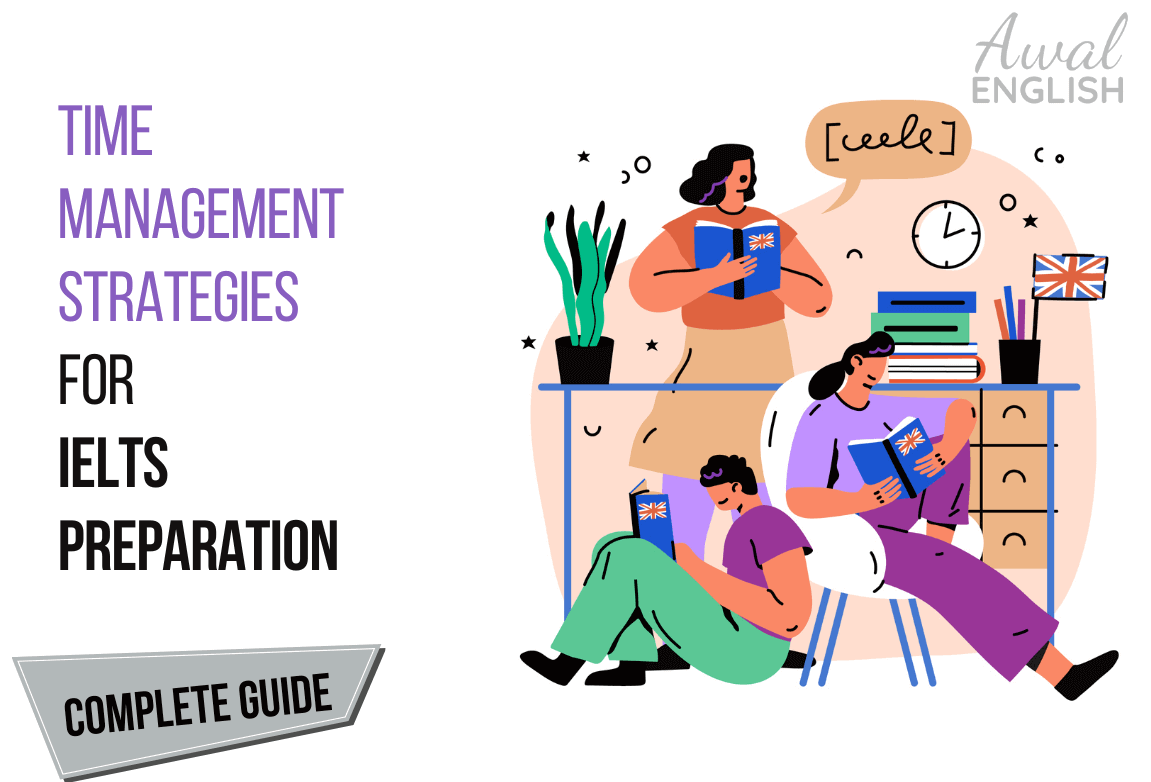
session with mentors
IELTS exam preparation necessitates a comprehensive approach, integrating language proficiency with efficient time management skills. The exam evaluates candidates across four key components: reading, writing, listening, and speaking. Effective time management ensures candidates can navigate through each section with confidence and precision.
Understanding the Test Format:
Improving Listening Skills for the IELTS Exam:
Active Listening with Focus: To enhance listening skills, it’s important to engage in active listening with full concentration. This means paying close attention to every word spoken in the audio. A real-life example could be listening to a podcast or a TED talk in English regularly. While listening, consciously try to understand the speaker’s message without getting distracted.
Note-taking Techniques: During the IELTS Listening section, candidates are allowed to take notes. Developing effective note-taking techniques can significantly aid in comprehension and retention. For example, jotting down keywords or key phrases rather than trying to write down every detail can help in capturing essential information. In real life, this skill can be practiced during meetings or lectures by summarizing key points in short, concise notes.
Repeated Practice: Like any other skill, listening proficiency improves with practice. Candidates can benefit from listening to a variety of English materials, such as podcasts, news broadcasts, or audiobooks, to expose themselves to different accents, speeds, and topics. For instance, regularly listening to English songs or watching English movies with subtitles can help in familiarizing oneself with the language’s rhythm and nuances.
Using Authentic Materials: Utilizing authentic English materials, such as TV shows, radio programs, or online videos, can offer exposure to real-life language usage and cultural contexts. For example, following English-speaking vloggers or influencers on social media platforms can provide insights into colloquial expressions and informal language usage.
What to Avoid During Listening?
Getting Hung Up on One Word: It’s common for candidates to get stuck on unfamiliar words during the listening section. However, dwelling on a single word can lead to missing out on subsequent information. Instead, it’s advisable to let go of the missed word and focus on understanding the overall context. For instance, if you’re watching an English movie and come across an unfamiliar word, try to grasp its meaning from the surrounding dialogue rather than pausing or rewinding repeatedly.
Panic and Rushing: Panicking or rushing through the listening section can hinder comprehension. It’s essential to stay calm and composed, even if some parts of the audio seem challenging. Practice mindfulness techniques to stay focused and relaxed during the exam. In real-life situations, such as attending a conference or participating in a group discussion in English, maintaining composure and listening attentively are equally important.
Improving Reading Proficiency for the IELTS Exam:
Strategic Reading Approaches: Use smart reading strategies suited to the types of texts you’ll find in the IELTS Reading section. Before going in detail, try some tricks to revise what you already know about the topic. Then, as you read, stay active by engaging with the text. After finishing, take a moment to think back on what you read to really memorize it. For example, if you’re tackling a tricky academic article, start by checking out the headings and subheadings to get an idea of what’s coming.
Critical Thinking Boost: Improve your critical thinking skills by carefully examining how authors make their arguments, considering the evidence they use, and noticing any assumptions they make. This type of thinking helps you understand texts more deeply and answer questions about them better. For example, when you read an opinion article or a research paper, try to decide if the author’s argument makes sense and if their sources are reliable.
Smart Time Management: Make sure you’re using your time wisely during the reading section. Practice dividing your time between the passages and questions so you can cover everything without rushing. For example, if you have three passages to read in an hour, aim to spend about 20 minutes on each one. This way, you can give each passage enough attention without running out of time.
Varied Reading Practice: Mix up your reading materials to get a feel for different writing styles and topics. Try reading from newspapers, magazines, academic journals, and online articles. This broadens your reading skills and helps you adapt to different types of texts. For example, reading stories from different cultures not only helps you get better at English but also helps you understand people from other backgrounds.
What to Avoid During Reading?
Getting Lost in Details: Don’t get too caught up in tiny details and forget about understanding the main ideas and structure of the passage. While paying attention to details is good, spending too much time on them can waste time and make it harder to understand. Instead, focus on understanding what the passage is mostly about and the message it’s trying to convey.
Reading Without Really Thinking: Avoid just checking through the text without really engaging with it or thinking critically about it. Passive reading like this makes it harder to understand and doesn’t help you develop analytical skills needed for the IELTS Reading section. Instead, try to actively interact with the text by asking yourself questions, making connections, and trying to figure things out as you read.
Using Translation Too Much: Try not to rely too heavily on translation or looking up every unfamiliar word you come across while reading. While it’s okay to check translations or meanings occasionally, relying too much on them can slow down your language learning and make it harder to understand naturally. Instead, try to guess the meaning of words from the context they’re used in and use clues from the text to help you understand.
Ignoring Instructions: Make sure to read and understand the instructions before answering the questions in the IELTS Reading section. Instructions can give you important information about the types of questions you’ll be asked, what answers you need to provide, and how much time you have. Skipping or misunderstanding instructions can lead to mistakes and hurt your performance. Similarly, in real life, not paying attention to instructions can cause misunderstandings or problems completing tasks.
Understanding the IELTS Writing Section:
Understanding and Planning: Start by really understanding what you need to do. Take your time to read and think about the question. Whether it’s comparing things, giving your opinions, or talking about good and bad points, make sure you know what the question is asking. Then, take a moment to plan what you’re going to write. Think about the main things you want to say and how you’ll organize your writing. Planning ahead can save you time and make your writing clear and organized.
Organizing Your Ideas: Arrange your writing in a clear and sensible way. Begin with an introduction that introduces your topic and briefly explains what you’re going to talk about. Then, use paragraphs to explain each of your main ideas.
Supporting Your Ideas: Back up your arguments with examples and evidence to make them stronger. Whether you’re giving your opinion, explaining something, or talking about good and bad points, using examples and evidence can help make your writing more convincing. Use things like personal experiences, history, or data to make your writing more interesting and believable. Also, think about what people might say against your ideas and talk about that too. This shows you understand the topic well.
What to Avoid in the Writing Section?
Going Off Topic: Stay on track with what you’re writing about. Make sure everything you say relates directly to the question. Avoid going off on tangents or talking about things that aren’t relevant. By sticking to the topic, you show you can answer the question properly.
Forgetting to Plan: Don’t just start writing without thinking first. Planning is important to make sure your writing makes sense. Without a plan, your writing might be messy and hard to understand. Take some time to think about your ideas and how you’ll organize them before you start writing.
Using Too Many Words: Don’t make your writing too long or complicated. Keep your sentences short and clear, and use words everyone can understand. Avoid using big words or complicated sentences that might confuse the reader. Aim to make your writing easy to understand so your message gets across clearly.
Forgetting to Check Your Work: Always check your writing before you finish. Look for any mistakes in spelling, grammar, or punctuation, and make sure your writing makes sense. Checking your work helps you fix any errors and make sure your writing is the best it can be. By taking the time to check your work, you show you care about getting it right.
Managing Time Effectively in the Listening Test:
Attentive Listening: Pay close attention to the audio recordings during the Listening section. Train yourself to focus on the speaker’s voice and listen for important details such as names, numbers, dates, and key information. For example, imagine you’re in a business meeting where your colleague is presenting important project updates. Practice active listening by engaging with the content and taking mental notes to retain crucial information.
Concise Note-Taking: Take brief and relevant notes while listening to the audio recordings. Develop a shorthand method or use symbols to capture essential points quickly. Focus on jotting down keywords or phrases rather than trying to transcribe every word. For instance, if you’re attending a lecture, practice note-taking by summarizing key concepts or ideas instead of writing down verbatim sentences. This helps in retaining information and aids in answering questions later.
Prompt Identification of Key Information: Train yourself to swiftly identify key information while listening to the recordings. Look out for clues such as specific details, instructions, or changes in tone or emphasis. For example, imagine you’re listening to a podcast interview where the host asks the guest about their upcoming projects. Pay attention to the guest’s response and note down any important dates or events mentioned. This skill is crucial for answering questions accurately and efficiently.
Time Allocation Strategies: Divide your time wisely among the different sections and tasks within the Listening test. Familiarize yourself with the format of the test and the number of questions in each section to allocate sufficient time for listening, note-taking, and answering questions. For example, if you know that each conversation or monologue will be followed by a set of questions, budget your time accordingly to ensure that you have enough time to review your notes and answer the questions accurately.
By implementing these strategies and practicing with real-life examples, you can improve your listening skills and effectively manage your time during the IELTS Listening test. This will help you to remain focused, retain crucial information, and answer questions with confidence.
Managing Time Effectively in the Reading Test:
Skimming for Main Ideas: Quickly skim through each passage to grasp the main idea and overall structure. Focus on reading the introductory paragraph and topic sentences of each paragraph to understand the central theme and key points. For example, when reading an article about climate change, skim through the text to identify the main arguments and possible solutions proposed by the author.
Scanning for Specific Details: Develop scanning techniques to locate specific information quickly when answering questions. Use keywords or phrases from the questions to guide your search within the passage. Scan for names, dates, numbers, or other relevant details that directly relate to the question at hand. For instance, if a question asks about the year a particular event occurred, scan the passage for numerical indicators such as dates or years.
Time Allocation for Each Question: Manage your time wisely by allocating a specific amount of time for each question or set of questions. Prioritize questions based on difficulty level and point value, focusing on easier questions first before tackling more challenging ones. For example, if you have multiple-choice questions followed by true/false/not given questions, allocate more time for the latter as they may require careful analysis of the passage.
Practice with Different Textual Formats: Familiarize yourself with various types of texts encountered in the Reading section, including articles, advertisements, academic papers, and reports. Practice reading materials from different genres and subject areas to adapt to diverse content and writing styles. For instance, read newspaper articles, scientific journals, online blogs, and literature to expose yourself to different textual formats and language conventions.
Develop Reading Speed and Comprehension: Improve your reading speed and comprehension through regular practice and targeted exercises. Practice reading passages within time constraints to simulate test conditions and enhance reading efficiency. Additionally, engage in activities such as speed reading drills, comprehension exercises, and vocabulary building to improve overall reading skills. For example, set a timer while reading a passage and aim to finish within a specified timeframe while still retaining key information.
By implementing these time management strategies and practicing with various textual formats, you can improve your efficiency and accuracy in the Reading section of the IELTS test. This will enable you to effectively skim passages for main ideas, scan for specific details, and allocate your time wisely when answering questions.
Managing Time Efficiently in the Writing Test:
Understanding the Task: Take the time to understand the writing prompt thoroughly. Make sure you know what you’re being asked to write about and what type of response is expected. For example, if the prompt asks you to discuss the advantages and disadvantages of a topic, such as online shopping, make sure you understand both sides of the argument before you start writing.
Planning Your Response: Before you begin writing, spend a few minutes planning your response. Think about the main points you want to include in your essay or report and how you will organize them. Consider making a brief outline to help guide your writing. For instance, if you’re writing about online shopping, you might plan to discuss the convenience of shopping online, the variety of products available, as well as the potential drawbacks such as security concerns or the lack of physical interaction.
Allocating Time: Once you’ve planned your response, allocate your time wisely. Decide how much time you’ll spend on each part of the writing process, including outlining, drafting, and revising. For example, if you have 40 minutes to write an essay, you might spend 5 minutes outlining your response, 25 minutes drafting your essay, and 10 minutes revising and editing.
Staying Focused: During the writing process, stay focused on the task at hand. Avoid getting sidetracked by irrelevant details or going off on tangents. Keep referring back to the prompt to make sure you’re staying on topic. For example, if you’re writing about the advantages and disadvantages of online shopping, make sure each paragraph is directly related to the topic and contributes to your overall argument.
Practice with Different Topics: To improve your time management skills, practice writing essays or reports on a variety of topics. This will help you become more comfortable with different types of writing tasks and develop a repertoire of ideas and examples to draw from. For instance, you might practice writing essays on topics such as the impact of social media, the importance of education, or the benefits of exercise.
By following these time management strategies and practicing with different writing topics, you can improve your efficiency and effectiveness in the Writing section of the IELTS test. This will help you plan your responses, organize your ideas, and allocate your time effectively to produce well-developed and coherent essays or reports.
Additional Points for Effective Time Management in IELTS Preparation:
Effective Time Tracking: Utilize timers or stopwatches during practice sessions to monitor your progress and identify areas where you may need to improve your time management skills. Set specific time limits for each section of the test and strive to stick to them as closely as possible. This helps you develop a sense of how much time you should allocate to each task during the actual exam.
Mock Tests and Analysis: Regularly take full-length mock IELTS practice test under timed conditions to simulate the actual IELTS exam experience. After completing each mock test, take the time to analyze your performance. Identify patterns in your strengths and weaknesses across different sections of the test. Use this analysis to adjust your study plan and focus your preparation efforts on areas where you need the most improvement.
Flexibility in Time Allocation: Recognize that each section of the IELTS test may require different amounts of time and energy to complete. Be flexible in your time management approach, adjusting your strategies based on your individual strengths and weaknesses in each section. For example, if you find that you struggle with the Reading section but excel in the Listening section, consider allocating more time for Reading practice while maintaining your proficiency in Listening.
Stress Management Techniques: Incorporate stress-reducing practices into your IELTS test preparation routine to help you stay calm and focused during the test. Deep breathing exercises, mindfulness meditation, and other relaxation techniques can help alleviate test anxiety and improve your ability to concentrate. Practice these techniques regularly to build resilience and maintain composure under pressure.
Continuous Improvement: Continuously evaluate your performance and progress throughout your IELTS preparation journey. After completing IELTS preparation online or mock tests, take the time to reflect on your performance and identify areas where you can improve. Adjust your study plans as needed to prioritize areas with the greatest potential for enhancement. By consistently seeking opportunities for growth and improvement, you can enhance your overall readiness for the IELTS exam.
Five Tips for Effective Time Management:
Immersive Familiarization with Test Format: Take the time to thoroughly familiarize yourself with the structure and requirements of the exam. Understand the format of each section, the types of questions asked, and the scoring criteria. This will help you approach the test with confidence and clarity, enabling you to manage your time more effectively during the exam.
Practicing under Simulated Conditions: Practice completing the exam under simulated conditions to get accustomed to the time constraints and pressure of the actual test. Set aside specific time slots to take practice tests or complete timed sections. This will help you develop a sense of how much time you have for each task and improve your ability to work efficiently under pressure.
Strategic Time Allocation: Prioritize your efforts by focusing on sections and tasks that yield the most points. Allocate your time strategically based on the point value of each question or task. For example, if certain sections of the exam are worth more points than others, allocate more time to those sections to maximize your score potential.
Methodical Essay Planning: Plan your essays meticulously to ensure coherent expression of ideas and effective use of time. Take the time to brainstorm ideas, outline your arguments, and organize your thoughts before you start writing. This will help you structure your essays more effectively and avoid wasting time on unnecessary revisions or tangents. A methodical approach to essay planning can significantly improve the quality of your writing and save time during the exam.
Conclusion:
Mastering time management is pivotal for success in the best IELTS preparation online. Through understanding the test format, practicing strategic time allocation, and continuous refinement of skills, candidates can enhance performance and achieve target scores in IELTS preparation course. With dedication and perseverance, mastering time management strategies while IELTS preparation at home not only aids success in the IELTS exam but also in academic and professional pursuits.





0 responses on "Time Management Strategies for IELTS Preparation"